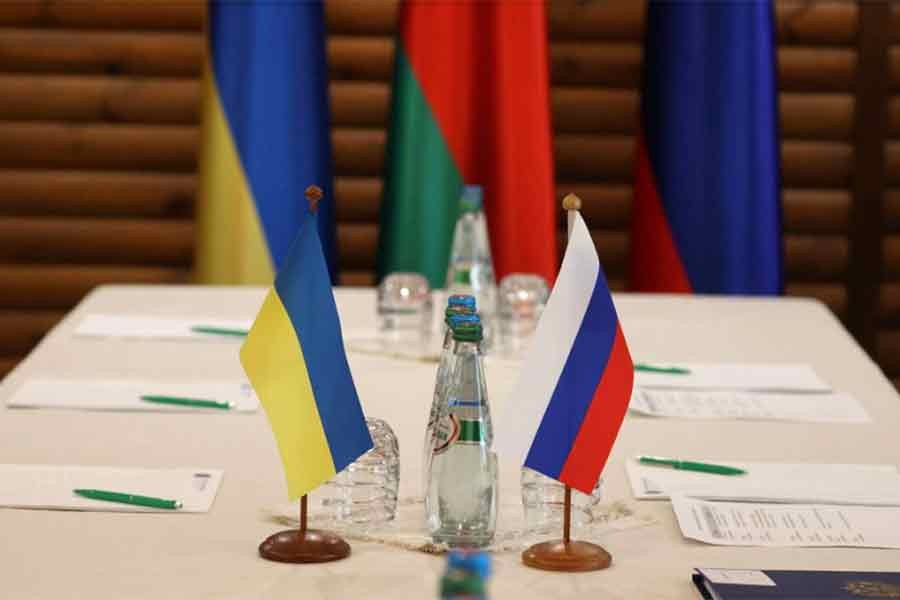Ukraine and Russia were preparing on Monday for the first face-to-face peace talks in more than two weeks, with Kyiv insisting it would make no concessions on ceding territory as battlefield momentum has shifted in its favour.
Ukrainian officials played down the chances of a major breakthrough at the talks, due to be held in Istanbul after Turkish President Tayyip Erdogan spoke to Russia's Vladimir Putin on Sunday, reports Reuters.
But the fact that they were taking place in person at all - for the first time since an acrimonious meeting between foreign ministers on March 10 - was a sign of shifts behind the scenes as Russia's invasion has become bogged down.
On the ground, there was no sign of respite for civilians in besieged cities, especially the devastated port of Mariupol, whose mayor said 160,000 people were still trapped inside and Russia was blocking attempts to evacuate them.
The Kremlin, for its part, said it was alarmed by comments by US President Joe Biden, who said during a speech on Saturday that President Vladimir Putin must not remain in power.
Russia and Ukraine said their delegations would arrive in Turkey on Monday, with the talks expected to start on Tuesday.
Ukrainian officials have recently suggested Russia could now be more willing to compromise, as any hope it may have held of imposing a new government on Kyiv slipped away in the face of stiff Ukrainian resistance and heavy Russian losses.
Russia's military signalled last week it was shifting focus to concentrate on expanding territory held by separatists in eastern Ukraine, a month after having committed the bulk of its huge invasion force to a failed assault on Kyiv.
When the sides last met in person, Ukraine accused Russian Foreign Minister Sergei Lavrov of ignoring its pleas to discuss a ceasefire, while Lavrov said a halt to fighting was not even on the agenda.
Since then, they have repeatedly met via video link, rather than face to face. Both sides have publicly discussed a formula under which Ukraine might accept some kind of formal neutral status. But neither has budged over Russia's territorial demands, including Crimea, which Moscow seized and annexed in 2014, and eastern territories known as the Donbas, which Moscow demands Kyiv cede to separatists.
"I don't think there will be any breakthrough on the main issues," Ukrainian interior ministry adviser Vadym Denysenko said on Monday.
In an interview with Russian journalists at the weekend, Ukrainian President Volodymyr Zelenskiy mentioned some form of compromise involving Donbas, although he did not suggest this might involve ceding the territory. In his latest comments overnight he made clear that "territorial integrity" remained Kyiv's priority.
MEASURED RESPONSE TO BIDEN CALL
The Kremlin, which regularly denounces the West over Ukraine in strong terms, has so far given only a measured response to Biden's surprise call at the weekend for an end to Putin's 22-year rule, perhaps to avoid drawing attention to it.
"For God's sake, this man cannot remain in power," Biden ad-libbed on Saturday at the end of a speech to a crowd in Warsaw. Washington and NATO have emphasised that removing Putin is not US or alliance policy, and on Sunday Biden said he was not calling for regime change.
Asked on Monday about Biden's comment, Kremlin spokesman Dmitry Peskov said: "This is a statement that is certainly alarming."
"We will continue to track the statements of the US president in the most attentive way," Peskov told reporters. Earlier Peskov had said it was up to the Russian people to pick their leader.
Russia calls its actions in Ukraine a "special military operation" to disarm and "denazify" its neighbour. Kyiv and the West consider this a pretext for an unprovoked invasion.
From the outset, Western countries said they believed Russia's true aim was to swiftly topple the Kyiv government, which Moscow has failed to achieve.
Last week, Ukrainian forces went on the offensive, pushing Russian troops back in areas around Kyiv, the northeast and the southwest. Russia has meanwhile kept up pressure in the southeast near separatist areas, including its devastating siege of Mariupol, razed to the ground while tens of thousands of civilians remain trapped inside.
Mayor Vadym Boichenko, who has escaped the city and was speaking from an undisclosed location, said 26 buses were waiting to evacuate some of the 160,000 trapped civilians but that Russia was denying safe passage.
"The situation in the city remains difficult. People are beyond the line of humanitarian catastrophe," Boichenko said on national television. "We need to completely evacuate Mariupol."
Ukraine's Deputy Prime Minister Iryna Vereshchuk said there were no plans to open corridors to evacuate civilians from besieged cities on Monday, because of intelligence reports of possible Russian "provocations" along the routes.
Elsewhere, Russia's armoured columns are bogged down, with trouble resupplying and making little or no progress, despite pounding residential areas.
"As of today, the enemy is regrouping its forces, but they cannot advance anywhere in Ukraine," Ukrainian Deputy Defence Minister Hanna Malyar said on Monday.
Britain's defence ministry also said there had been no major change in Russia's positions in the past 24 hours, with most Russian gains near Mariupol and heavy fighting underway there.
Ukraine's General Staff said Kyiv defence forces were holding back Russian troops trying to break through from the northeast and northwest and take over key roads and settlements.
In the south, Ukrainian forces were focused on defending the cities of Krivy Rih, Zaporizhzhia and Mykolayiv.


